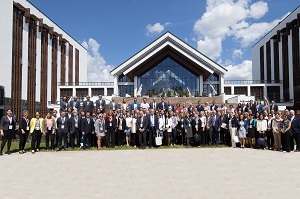
Strategic environmental assessment and environmental impact assessment in a transboundary context can play an important role in helping countries to achieve the Sustainable Development Goals (SDGs) and address climate change. This was one of the central messages of the Meetings of the Parties (MoP) to the UNECE Convention on Environmental Impact Assessment (EIA) in a Transboundary Context (Espoo Convention) and its Protocol on Strategic Environmental Assessment (SEA) held in Minsk, Belarus (13-16 June 2017).
The sessions were attended by some 200 Government officials, including several Ministers during the high-level segment on Friday, 16 June, representatives of international organizations, international financial institutions (IFIs), civil society, academia and other stakeholders from some 50 countries.
Throughout the sessions, delegates stressed the important contribution of the two cross-cutting legal instruments to promoting environmental governance and the integration of environmental and health considerations as key features of economic development.
The Minsk Declaration adopted at the Meeting’s high-level segment enshrines the commitment of Parties to advancing the incorporation of climate change related considerations into strategic planning and project development through SEA and EIA. The Declaration also pays tribute to the Espoo Convention, which celebrates the twentieth anniversary of its entry into force, and calls for wider accession of UNECE member States to both treaties and to strengthen exchange and cooperation with other world regions.
A key outcome of the sessions was the adoption by Parties of “Good practice recommendations on the application of the Convention to nuclear energy-related activities”. This was welcomed in particular by civil society participants, along with the decision by Parties to develop clear guidance on how to apply the Espoo Convention to the life-time extension of nuclear power plants – a pressing issue given the large number of aging nuclear power plants in the UNECE region.
On the draft decision on compliance with the Espoo Convention, which included several complex nuclear energy-related issues, the Parties agreed that further efforts were still necessary to reach consensus. Consequently, the deliberations will be finalized at an “intermediary” session of the Meeting of the Parties to the Convention, to be convened in late 2018 or early 2019, which would also address any other issues that may arise.
During the sessions, Parties mandated the Implementation Committee under the Convention and the Protocol to prepare a revised draft decision on compliance for consideration by the Parties, taking into account the work carried out during and in the margins of the sessions held in Minsk.
Meeting documents are available at: http://www.unece.org/index.php?id=45098#/

